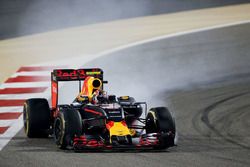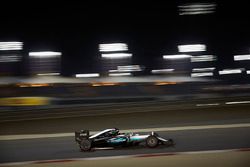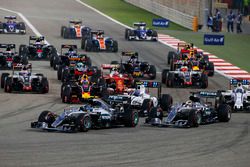Analysis: Does F1 still need faster cars in 2017?
After Lewis Hamilton's Mercedes W07 smashed the qualifying lap record in Bahrain, is Formula 1 right to continue pushing for a significant speed increase for 2017? Jonathan Noble delves into the data.

Photo by: XPB Images


















Formula 1's quest to deliver cars that are up to five seconds per lap faster in 2017 has already prompted concerns from drivers about the impact extra downforce will have on overtaking.
But beyond that, an intriguing reduction in lap times this year – that has finally allowed the hybrid generation of machinery to beat some old records – has more recently added a fresh dynamic to the debate about whether or not next year's changes are needed.
After all, if Lewis Hamilton was able to beat an 11-year-old outright benchmark (set by Mark Webber in a practice session in 2005) in Bahrain, there is a strong argument to suggest that the current cars are plenty fast enough anyway.
But are the Saturday performances telling the true story of where the current generation of cars stack up against previous machinery in the speed stakes? Below we take a look at the data.
Hamilton records
With the fiasco surrounding elimination qualifying dominating the Saturday agenda over the first two races of the season, the pace of 2016 F1 cars has been somewhat overlooked.
Just two years on from the new hybrid turbo cars being criticised for being too slow – which prompted the 2017 shake-up – developments to engines, aerodynamics and tyres have delivered a dramatic step forward in pace.
Taking the Bahrain Grand Prix as an example, the pole position time has come down by more than three seconds in just two years.
In 2014, Nico Rosberg sealed the front spot of the grid with 1m33.185s. Last year, Lewis Hamilton took the top spot with 1m32.571s, while earlier this month the Briton's top time was 1m29.493s.
That brilliant Saturday evening lap was significantly 0.034s clear of the previous best ever lap set by Webber in practice in 2005 (qualifying times were not outstanding that year due to the single lap shoot-out format plus race fuel levels of fuel).
So with F1 back at the previous performance tweaks, is there a need for them to be quicker?
Actually, yes.
Race pace
One of the impetuses that made F1 chiefs look at the performance of F1 cars was that drivers bemoaned the lack of a challenge.
The need to conserve tyres and fuel had turned grands prix from what were once flat-out sprints from lights to flag into what some claimed were Sunday economy runs.
And while the single lap pace of 2016 machinery has shown that hybrid cars can be quick, a review of historical data shows they are still lacking when it comes to races – especially in the early stages.
This decline in race performance is something that Kimi Raikkonen highlighted as one of the big differences between the pace of cars back in 2005 and now.
“They are obviously, completely different things,” he said. “In 2005 we had qualifying, we run the fuel that we run in the race. You cannot compare as it is a long time ago.
But obviously the thing is that one lap we can be quite fast but [in the race] we will put the car with the lot of fuel and all the rest we are a lot, lot slower, so that’s where the big difference is between 10 years ago and now. The race times are nowhere near what we used to do.”
2005 comparison
A quick look at the early race pace of this year's Bahrain Grand Prix and how it was in 2005 shows exactly what Raikkonen is referring to.
For the first 10 laps of the 2005 Bahrain Grand Prix, which Alonso started with his first load of fuel that he had qualified with, his laps were:
| Alonso (Bahrain 2005) | Rosberg (Bahrain 2016) | |
| 1m36.403s | Lap 1 (+3.055s) | 1m39.458s |
| 1m33.954s | Lap 2 (+4.195s) |
1m38.149s |
| 1m33.559s | Lap 3 (+4.172s) |
1m37.731s |
| 1m33.206s | Lap 4 (+4.277s) |
1m37.483s |
| 1m33.218s | Lap 5 (+4.455s) |
1m37.663s |
| 1m33.174s | Lap 6 (+4.580s) |
1m37.754s |
| 1m32.894s | Lap 7 (+4.893s) |
1m37.787s |
| 1m33.072s | Lap 8 (+4.736s) |
1m37.808s |
| 1m33.368s | Lap 9 (+4.806s) |
1m38.174s |
| 1m33.402s | Lap 10 (+4.895s) |
1m38.297s |
In just those 10 laps, Alonso's 2005 car would be almost 45 seconds up the road. In fact, Alonso's race-winning time of 1hr29m18.531s was more than four minutes quicker than the 1hr33m34.696s it took Nico Rosberg to win this year.
Further comparisons show that the overall lap record from the race is different too – Pedro de la Rosa's 1m31.447s in 2005 compares to Rosberg's 1m34.482s this year.
Of course, the explanation for the speed differential can be explained through a combination of obvious factors: much heavier cars, full race levels of fuel and a different philosophy of tyres.
But it shows that despite the headline pace of F1 cars on Saturdays, there is still plenty of room to deliver speed improvements in 2017 – especially on race day.
Statistics collected by Darshan Chokhani
Be part of Motorsport community
Join the conversationShare Or Save This Story
Subscribe and access Motorsport.com with your ad-blocker.
From Formula 1 to MotoGP we report straight from the paddock because we love our sport, just like you. In order to keep delivering our expert journalism, our website uses advertising. Still, we want to give you the opportunity to enjoy an ad-free and tracker-free website and to continue using your adblocker.















Top Comments